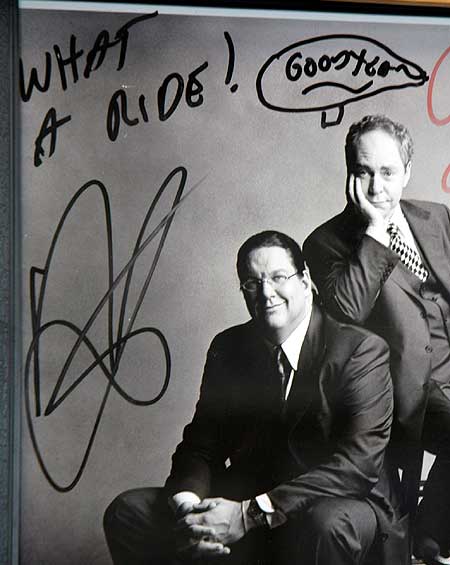Topic: Couldn't be so...
Resolving Dissonance: Major and Minor Illustrations
Enough of the congressman from the squat mountains east of Pittsburgh (Johnstown and that area) saying it's time for an orderly but rather rapid withdrawal of our troops from Iraq, as they've done as much as they can do, and keeping them there is making many things worse. The firestorm raging from that proposal last week goes on and on, and sucks in other issues - whether we were conned into this war and all the rest. There's been a good deal of name-calling as to who's a coward and who's not, and who's delusional about what we have achieved, and can reasonably achieve, and who's not.
All that may settle down into an orderly discussion of what we should do now and why we should do this or that, carefully balancing risk and opportunity, considering our short-term and long-term strategic aims, considering what is likely to happen when we're gone from there, considering what staying indefinitely or leaving soon would mean in geopolitical terms about our influence in the world (our power to bring others into approving of or even joining in our actions), and what that would do to our military capabilities, now stretched thin - but you wouldn't bet the rent money on such a discussion developing.
Too many have too much emotionally invested in this, one way or the other, to step back and think about all the complex implications of what we do now, so dispassionate and detailed analysis is almost impossible - and politicians facing the 2006 mid-term elections know that the dramatic posturing they do now can make the difference between staying in office and going back to writing wills and reviewing minor business contracts at the local law office.
But Tuesday, November 22nd things got even more complicated with the results of that conference in Cairo - Iraqi President Jalal Talabani and Iraqi Shiite and Kurdish lawmakers, as well as leading Sunni politicians, agreeing on a few things.
From the Associated Press account (Salah Nasrawi) here -
The Bush-Cheney admistration has argued with great energy that that last thing we should have is any kind of timetable for withdrawal. That would play into the hands of the bad guys - they'd just wait for us to leave and then do whatever bad guys do, and everything we've fought for would be lost. And here the three key groups we're doing all this for, say no, they do want a timetable.Leaders of Iraq's sharply divided Shiites, Kurds and Sunnis called Monday for a timetable for the withdrawal of U.S.-led forces in the country and said Iraq's opposition had a "legitimate right'' of resistance.
The final communiqué, hammered out at the end of three days of negotiations at a preparatory reconciliation conference under the auspices of the Arab League, condemned terrorism, but was a clear acknowledgment of the Sunni position that insurgents should not be labeled as terrorists if their operations do not target innocent civilians or institutions designed to provide for the welfare of Iraqi citizens.
The participants in Cairo agreed on "calling for the withdrawal of foreign troops according to a timetable, through putting in place an immediate national program to rebuild the armed forces ... control the borders and the security situation'' and end terror attacks.
Now much can be said about this, and much has, but the paternalistic and condescending " trust us, you don't really want that" messages no doubt burning up the diplomatic cable lines from DC to Baghdad after this Cairo pronouncement may make those we helped to power a bit angry. It appears we didn't ask them what they think, so we got blindsided.
The paternalism here is deciding what's best for your little kids - you don't ask them because they're too immature to know what's best for them. That's far beyond insulting when the other folks are just not kids, although fine for your five-year-olds. Oddly, this you-really-don't-know-what's-good-for-you paternalism is the defining characteristic of this administration. One suspects those who don't have much use for this gang, and haven't had since they came to power - a good chunk of the public here and around the world, and almost all other world leaders - are, underneath it all, seething a being told, implicitly, they're all little kids and really should let they grownups take care of things. Oddly, Tony Blair has no problem with it, and being told for years he's "Bush's poodle" seems to make him smile. Ah well.
They shouldn't have said "timetable."
Of course there will be the usual cover-up of the miscue - not everyone seems to be on the same page, as they say - with Washington saying everyone concerned really agrees, really, and this pronouncement is just what the president has been saying all along - "As the Iraqis stand up we stand down." No big deal.
But they had to go and use that word "timetable." One imagines our "from the gut" instinct-driven keep-it-simple my-way-or-the-highway president is well beyond miffed with these folks, but how does he lash out? What can he do?
Buried in the Cairo communiqué is, however, something even more problematic. You saw it. The leaders of the Shiites, Kurds and Sunnis said Iraq's opposition had a "legitimate right" of resistance - "a clear acknowledgment of the Sunni position that insurgents should not be labeled as terrorists if their operations do not target innocent civilians or institutions designed to provide for the welfare of Iraqi citizens."
Think about that. A "legitimate right" of resistance to what? Would that be to our guys on the ground, or are our guys there "to provide for the welfare of Iraqi citizens." The ambiguity is maddening. This can be interpreted as the combined factions saying, "Don't call us terrorists if we exercise our legitimate right to resist the foreign occupiers of our country." What else could it mean?
One view here - "In other words, Iraq's leaders just painted a bullseye on the backs of American soldiers and said they're fair game."
Are there other foreign occupiers? Who else is there to resist but us?
There's a lot of angry comment out there on this, and we'll see how the administration explains this one away. They don't really mean what they say about some "legitimate right of resistance" - it was just something they threw into the mix to mollify the Sunni folks and really shouldn't be taken seriously? That's probably the best approach. Someone will look thoughtful on Fox News and say just that, no doubt. But these guys in Cairo made things harder to explain.
And there was more to explain the same Tuesday. The White House dismissed claims George Bush was talked out of bombing Arab television station al-Jazeera by Tony Blair. What? According to this in the British tabloid Daily Mirror, that's what happened on April 16 last year. We were launching that all-out assault on Fallujah, and al-Jazeera had reporter in there showing the world civilian casualties and such. Bush was angry. Was he kidding about bombing al-Jazeera headquarters in Qatar, one of our close allies in the area and where we have major sating areas? Who knows? There seems to be a memo about this.
Reaction to the Mirror items was intense. It does put the previous "accidental" bombings of Al-Jazeera and the "inadvertent" death of this or that journalist in Iraq in a different light. Maybe Eason Jordon was right. As noted in these pages last February, Eason Jordan resigned his position as CNN's chief news executive - and he had led much of that network's war coverage. It seems that on January 27 in Davos, Switzerland, at The World Economic Forum, in an informal panel discussion, he suggested that US troops had targeted and killed journalists. He immediately back-peddled and said that was what was being said in much of the Arab media, and he didn't know that was so - but the damage was done. Word got around. The same right-wing blogs that claimed to have just brought down Dan Rather sensed blood in the water, Fox News picked it up, and the fellow threw in the towel. And now?
Oh, this is a minor thing. Even if Bush was serious, Blair talked him down. Sometimes the clever child can calm the angry parent before daddy does something bad.
But the major things keep percolating away.
No, not this:
There's lots of detail, and this information was withheld from the House and Senate Intelligence Committees.Ten days after the September 11, 2001, terrorist attacks on the World Trade Center and the Pentagon, President Bush was told in a highly classified briefing that the U.S. intelligence community had no evidence linking the Iraqi regime of Saddam Hussein to the attacks and that there was scant credible evidence that Iraq had any significant collaborative ties with Al Qaeda, according to government records and current and former officials with firsthand knowledge of the matter.
Is this a "smoking gun" of some sort?
Maybe. The administration was told, flat-out, that line of thinking was wrong - and decided they knew better than the spies in the field and the nerds who monitored satellite traffic and the political analysts and all the rest? This merely explains why Cheney and Rumsfeld set up Douglas Feith's Office of Special Plans - to show that the CIA and Defense Intelligence and the National Reconnaissance Office and State were all wrong - and to have something BETTER for the congress. Some would call it ignoring the facts. Some would call it lying to congress and the public. Some would call it crass manipulation and maybe an impeachable offense. And some would call it patriotic enthusiasm for what had to be done. Take your pick.
The dispute continues.
All that is surface. What lies below is more troubling.
If you have wandered over to the Just Above Sunset page of links to the big-time political web logs, left and right (here - but in need of a few updates), you find a link to a satire site - Patriot Boy - where General JC Christian signs each item "Heterosexually Yours" - the manly man - and tries to rid himself of his "inner Frenchman" and wonders why his little general (and two grenades) won't stand up at attention when called upon. You get the idea. It's political satire at its snarkiest.
But Tuesday the 22nd something happened, as in this -
Sometimes you just cannot do satire. It's just wrong.Forgive me for interrupting, but for the last few hours I've been struggling with a post juxtaposing the Christian right's obsession with sexual morality and theocracy with their lack of concern about torture and murder. I can't finish. It's too painful to address satirically.
I've been in a funk for the last few weeks. I'm absolutely horrified by what my country has become. Corruption has replaced the rule of law. The media has sold its watchdog role for a few pieces of silver and invitations to the ruling class' cocktail parties. The owners in our ownership society are rigging the system to enslave the rest of the population through debt.
Worst of all, where we were once a nation that at least pretended to value human rights, we now celebrate torture and eagerly commit murder in the name of promoting freedom.
America has lost its soul.
What bothers him is what lots of people have thought about - what Jason Vest reported in the National Journal here -
That's where we are."If you talk to people who have been tortured, that gives you a pretty good idea not only as to what it does to them, but what it does to the people who do it," he said. "One of my main objections to torture is what it does to the guys who actually inflict the torture. It does bad things. I have talked to a bunch of people who had been tortured who, when they talked to me, would tell me things they had not told their torturers, and I would ask, 'Why didn't you tell that to the guys who were torturing you?' They said that their torturers got so involved that they didn't even bother to ask questions." Ultimately, he said - echoing Gerber's comments - "torture becomes an end unto itself."
Digby at Hullabaloo adds this -
And there's this from The Observer (UK) -When Daniel Patrick Moynihan coined the phrase "defining deviancy down" he couldn't ever have dreamed that we would in a few short decades be at a place where torture is no longer considered a taboo. It certainly makes all of his concerns about changes to the nuclear family (and oral sex) seem trivial by comparison. We are now a society that on some official levels has decided that torture is no longer a deviant, unspeakable behavior, but rather a useful tool. It's not hidden. People publicly discuss whether torture is really torture if it features less than "pain equivalent to organ failure." People no longer instinctively recoil at the word - it has become a launching pad for vigorous debate about whether people are deserving of certain universal human rights. It spirals down from there.
... At this rather late stage in life, I'm realizing that the solid America I thought I knew may never have existed. Running very close, under the surface, was a frightened, somewhat hysterical culture that could lose its civilized moorings all at once. I had naively thought that there were some things that Americans would find unthinkable - torture was one of them
And there's this from Seymour Hersh -Baghdad's Medical Forensic Institute - the mortuary - is a low, modern building reached via a narrow street. Most days it is filled with families of the dead. They come here for two reasons. One group, animated and noisy in grief, comes to collect its dead. The other, however, returns day after day to poke through the new cargoes of corpses ferried in by ambulance, looking for a face or clothes they might recognise. They are the relatives and friends of the 'disappeared', searching for their men. And when the disappeared are finally found, on the streets or in the city's massive rubbish dumps, or in the river, their bodies bear the all-too-telling signs of a savage beating, often with electrical cables, followed by the inevitable bullet to the head.
And this from Bill Montgomery -"Do you remember the right-wing execution squads in El Salvador?" the former high-level intelligence official asked me, referring to the military-led gangs that committed atrocities in the early nineteen-eighties. "We founded them and we financed them," he said. "The objective now is to recruit locals in any area we want. And we aren't going to tell Congress about it." A former military officer, who has knowledge of the Pentagon's commando capabilities, said, "We're going to be riding with the bad boys."
And so we are.It's apparent - both from this story and from reports by human rights groups (note the date on that one) -- that the U.S. and U.K. embassies have been aware for some time that Iraq's Ministry of the Interior has been turned into what the old National Guard used to be in El Salvador, or the Presidential Intelligence Unit in Guatemala, or the National Directorate of Investigation in Honduras, which is to say: death squad central.
Truly, to quote Leonard - the psychotic recruit in Full Metal Jacket - we are in a world of shit.
The General also links on the BBC item on just what white phosphorous does to folks, and adds a photo. He says, "Let's not forget to revel in our God-like power to destroy cities with storms of fire and brimstone."
He then says, "I can't bear the thought of my grandson living in the world these bastards are creating. We have to do all we can to defeat them."
Satire is not appropriate.
Yeah, but this has been going on a long time.
We've been here before, with the same cast of characters.
See this from Newsweek last January -
And so we have. The death squads are back.The Pentagon is intensively debating an option that dates back to a still-secret strategy in the Reagan administration's battle against the leftist guerrilla insurgency in El Salvador in the early 1980s. Then, faced with a losing war against Salvadoran rebels, the U.S. government funded or supported "nationalist" forces that allegedly included so-called death squads directed to hunt down and kill rebel leaders and sympathizers. ? One military source involved in the Pentagon debate suggests that new offensive operations are needed that would create a fear of aiding the insurgency. "The Sunni population is paying no price for the support it is giving to the terrorists," he said. "From their point of view, it is cost-free. We have to change that equation."
That Newsweek item was mentioned in these pages last January here, with the note that this time around we have to make sure we don't end up raping and killing any nuns, as American Catholics do vote. (El Salvador - December 2, 1980 - four American nuns are killed by a death squad in El Salvador - financed and armed by the United States - our key guy for El Salvador at the time was John Negroponte - see CNN here.)
John Negroponte? Montgomery reminds us -
And so on and so forth. Same crew. Same results."I'm pleased to announce my decision to nominate Ambassador John Negroponte as Director of National Intelligence ? John brings a unique set of skills to these challenges."
George W. Bush
Nomination Ceremony
February 17, 2005
Among his more recent assignments, Mr. Negroponte was Ambassador to Honduras (1981-85).
U.S. Mission to the United Nations
Biography of John D. Negroponte
The DNI [National Directorate of Investigation] maintained a secret unit - the Honduran Anti-Communist Liberation Army (ELACH), a rightist paramilitary organization which conducted operations against Honduran leftists. According to DELETED, during the period ELACH operated (1980-1984), ELACH's operations included surveillance, kidnappings, interrogation under duress, and execution of prisoners who were Honduran revolutionaries.
CIA Inspector General's Office
Selected Issues Relating to CIA Activities in Honduras in the 1980s
August 27, 1997
John D. Negroponte - US ambassador to the United Nations from September of 2001 until June 2004 and US ambassador to Iraq from June 2004 to April 2005, and now Director of National Intelligence.
Why is "Patriot Boy" surprised?
Posted by Alan at 21:39 PST
|
Post Comment |
Permalink
Updated: Tuesday, 22 November 2005 21:58 PST
home






